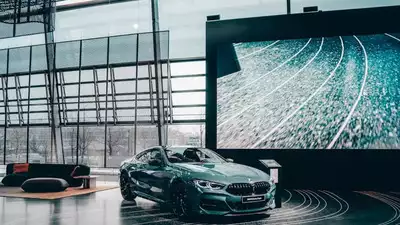
The integration of AI in XR for modern automobiles This article is authored by Prashant Sinha, Founder & CEO, BiUp.ai. With the advent of artificial intelligence (AI), the car industry remains no longer a futuristic fiction.
AI has transformed the way people design, build and use vehicles. Some of the technologies, like robotics, computer vision, natural language processing (NLP), and machine learning (ML), are utilized in cars to increase efficiency and safety. This includes predictive maintenance, personalised in-car experiences and intelligent manufacturing processes.

Moreover, AI integration not only increases car performance but also changes the way people interact with autos. Among technical breakthroughs, AI-powered XR experiences have emerged as a game changer for auto brands, reinventing the traditional buying experience and increasing client involvement. Evolution of Traditional Buying Journey from Physical to Physital Conventional showrooms have long been an integral component of the retail industry, offering customers a real place to examine products, interact with marketers and make well-informed purchase decisions.
However, in an ever-growing digital age, the limitations of physical showrooms have become apparent. From geographical limits to restricted product displays, businesses are looking for inventive ways to overcome these obstacles and give customers immersive experiences that equal an ordinary showroom visit. Perks of Virtual Showrooms & Product Configurator Virtual showrooms & Product Configurator have emerged as a novel way to initiate client interaction using cutting-edge 3D & XR technology for creating immersive digital worlds; this helps customers explore & examine products in amazing detail from the comfort of their own homes or workplaces.
These virtual showrooms replicate the appearance and feel of a physical showroom, providing a seamless and interactive purchasing experience that overcomes geographical and temporal limits. Personalised Recommendations: AI-powered avatars and chatbots communicate with customers in natural language. These virtual assistants provide personalised suggestions based on each consumer's interests and requirements.
This in turn improves the purchasing experience of customers by giving an interactive method to explore and compare autos. Moreover, these chatbots and avatars are accessible 24/7 to respond to customers' enquiries, questions and concerns. Virtual Test Drives Automotive industries are offering virtual test drives by using VR (virtual reality) to recreate realistic driving experiences in digital environments.
Users may fully immerse themselves in authentic driving situations, including urban streets, highways, and off-road terrain, by donning VR headsets. Also, virtual demos allow buyers to examine automobile features through interactive digital encounters. As per Fortune Business Insights, the global virtual reality in the automotive industry is anticipated to reach USD 37.
13 billion by 2032, owing to the technology benefits. In addition, virtual test drives help to reduce the environmental effects of traditional test drives, including fuel usage and vehicle emissions. Decoding Skoda Kylaq's design with Oliver Stefani | TOI Auto Building Customer Trust Adopting 360 auto dealership photography, transforms the experience for both showroom salespersons and customers.
This technology contributes to a virtual showroom experience that is convenient, creates confidence and increases sales. With technological improvements, it is projected that there will be more interesting features in VR showrooms, AI-powered personalised suggestions and interactive hotspots that will seamlessly integrate the online and physical automobile purchase experiences. In conclusion, artificial intelligence is revolutionising the automobile industry, altering the way customers experience car showrooms and interact with vehicles.
With immersive experiences, enhanced customer satisfaction and streamlining of sales processes, this technology is changing the way cars are bought and sold, inventing the concept of virtual showrooms. As technology advances, more exciting possibilities in the future can be unfolded in this dimension. Whether an individual is a car enthusiast or a business executive, now is the time to embrace the potential of AI in the automobile industry.
Disclaimer: Views and opinions expressed in this article are solely those of the original author and do not represent any of The Times Group or its employees..














